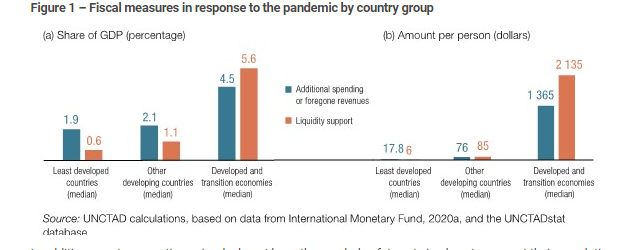The United Nations Conference on Trade and Development, UNCTAD projected today (Thursday) that the global economy will contract by a staggering 4.3% in 2020.
UNCTAD, therefore, warns that this contraction could send an additional 130 million people into extreme poverty. This is according to its report on “Impact of the COVID-19 Pandemic on Trade and Development: Transitioning to a New Normal.
The report provides a comprehensive assessment of the economic knock-ons from the Covid-19 pandemic.
It highlighted how the effects of the pandemic undermined progress on poverty and other important sustainable development goals.
Vaccine Expectation
Meanwhile, Pfizer and Moderna lifted the spirits of the markets with separate announcements that their vaccines have shown to be more than 90% effective in late-stage clinical trials.
But while there is growing confidence that an end to the health pandemic is in sight, the report warns that a viable vaccine will not halt the spread of economic damage.
The damage will be felt long into the future, especially by the poorest and most vulnerable.
UNCTAD charts a roadmap for more inclusive trade and economic development, emphasizing the need to reshape global production networks.
The way the world economy is set up is partly to blame for the disproportionate impact on the world’s poorest, who lack the resources necessary to respond to shocks such as COVID-19, the report says.
“The COVID-19 pandemic has gravely wounded the world economy with serious consequences for everyone,”
UNCTAD Secretary-General Mukhisa Kituyi said.
“Moving rapidly across borders, along the principal arteries of the global economy, the spread of the virus has benefited from the underlying interconnectedness – and frailties – of globalization, catapulting a global health crisis into a global economic shock that has hit the most vulnerable the hardest.”
Recovery Plan
The report finds the United Nations’ Sustainable Development Agenda 2030 will be derailed unless immediate policy actions are taken, especially in favor of the poorest.
A better recovery must center on renewed trade policy that tackles the twin challenges of market concentration and environmental impact, the report says.
It also notes there is a pressing need to reshape global production networks to be more green, inclusive, and sustainable.
A crisis of uneven impacts…
In the report, UNCTAD tracks the deepening impact of the virus on all areas of the world economy. It also maps how the crisis has affected global trade, investment, production, employment, and ultimately, individual livelihoods.
The report finds that the pandemic’s impact has been asymmetric and tilted towards the most vulnerable. The pandemic disproportionately affected low-income households, migrants, informal workers, and women, the report says.
Global Poverty
Global poverty is on the rise for the first time since the 1998 Asian financial crisis. In 1990, the global poverty rate was 35.9%.
By 2018 it had been curtailed to 8.6% but has already inched up to 8.8% this year and will likely rise throughout 2021.
Additionally, COVID-19 has had a disproportionate effect on two sectors – tourism and micro, small and medium-sized enterprises. The sector employs many vulnerable groups.

…and uneven responses
The report highlights that the median additional spending per capita on the fiscal stimulus or foregone revenues in developed countries and economies in transition has been $1,365 since the outbreak, compared to just $18 in the least developed countries and $76 in other developing nations.
In addition, most poor nations simply do not have the needed safety nets in place to support their populations.
The report estimates that about 79.4% of workers in sub-Saharan Africa and 84.5% of workers in LDCs do not have access to any social protection or labor programs.
The report calls for stepped-up international assistance. This would include offering debt relief to many poorer nations so that they have the fiscal space needed to address the pandemic’s economic impacts on their populations.
A roadmap for better recovery
In the report, UNCTAD provides a roadmap for recovery that requires an overdue and opportune shift in the structure of global trade and cooperation.
“COVID-19 has been painful and course-altering, but it is also a catalyst for needed change,” Dr. Kituyi said. “We need to reshape global production networks and reset multilateral cooperation for the better.”
